Headline News Archive
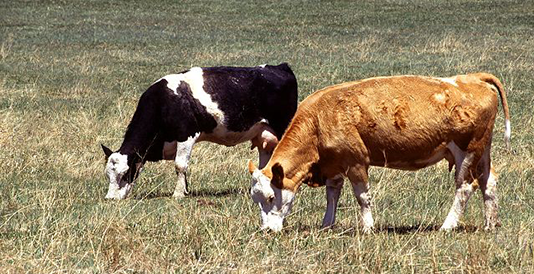 January 29, 2016 - Soils in grazing lands are influencing greenhouse gas concentrations via the release of carbon dioxide and nitrous oxide produced by microbes. A new study funded by USDA-AFRI will investigate how grazing land management and environmental factors (temperature and precipitation) affects the microbial community, and how microbial activity and greenhouse gas production are shaped by these factors. Field measurements and laboratory experiments will be tied to molecular analysis that assess microbial community structure (who is there?) and function (what are they doing?). The goal of the work is to have a modeling tool that can predict the release of carbon dioxide and nitrous oxide from soils under a climate that is expected to be warmer and experience more extreme dry/wet periods across the Southeastern US.
January 29, 2016 - Soils in grazing lands are influencing greenhouse gas concentrations via the release of carbon dioxide and nitrous oxide produced by microbes. A new study funded by USDA-AFRI will investigate how grazing land management and environmental factors (temperature and precipitation) affects the microbial community, and how microbial activity and greenhouse gas production are shaped by these factors. Field measurements and laboratory experiments will be tied to molecular analysis that assess microbial community structure (who is there?) and function (what are they doing?). The goal of the work is to have a modeling tool that can predict the release of carbon dioxide and nitrous oxide from soils under a climate that is expected to be warmer and experience more extreme dry/wet periods across the Southeastern US.Project Title: “Climate Sensitivity Of Microbial Processes And Their Implication For Carbon Sequestration And Greenhouse Gas Fluxes In Subtropical Pastures”
Award Total: $710,000
Team: Stefan Gerber (PI), Patrick Inglett (Co-PI), Kanika Inglett (Co-PI), and Maria Silveira (Co-PI) (all from Soil and Water Science Department, University of Florida); and Ryan Penton (Co-PI; Arizona State University).
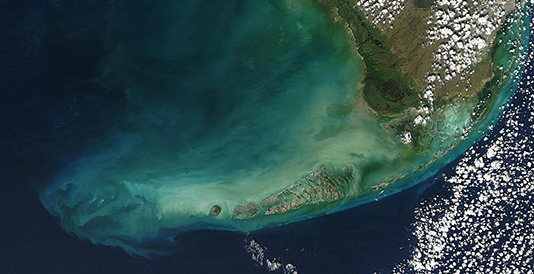 January 27, 2016 - On January 26, 2016, Florida Sea Grant Coastal Planning Specialist Thomas Ruppert was part of a team that presented a workshop on climate change and sea level rise to the Monroe County Board of County Commissioners in the Florida Keys. The workshop was led by Rhonda Haag, Sustainability Manager of Monroe County, and Erin Deady, a consultant hired by Monroe County to help them plan climate change mitigation and sea level rise adaptation. The all-day workshop summarized two years of work by Ms. Deady and her team, which also included Dr. Jason Evans of Stetson University; Alicia Betancourt, UF IFAS Extension Agent; Chris Berg, The Nature Conservancy; and Thomas Ruppert, Florida Sea Grant. Mr. Ruppert presented on one of the key focus areas of the workshop: adapting to sea level rise and how Monroe County can work to balance the costs of maintaining roads being impacted by sea level rise and the rights of property owners to access their property via impacted roads. Mr. Ruppert explained to the Board of County Commissioners a model ordinance developed by Mr. Ruppert along with John Fergus of Satellite Beach and Stetson Law student/Florida Sea Grant legal intern Alex Stewart. Mr. Ruppert and Monroe County Attorney Bob Shillinger fielded numerous questions from the Commission about the model ordinance. Adoption of the model ordinance formed one of many recommendations received by the Board as part of the recommendations in a 5-year implementation plan presented by Ms. Deady.
January 27, 2016 - On January 26, 2016, Florida Sea Grant Coastal Planning Specialist Thomas Ruppert was part of a team that presented a workshop on climate change and sea level rise to the Monroe County Board of County Commissioners in the Florida Keys. The workshop was led by Rhonda Haag, Sustainability Manager of Monroe County, and Erin Deady, a consultant hired by Monroe County to help them plan climate change mitigation and sea level rise adaptation. The all-day workshop summarized two years of work by Ms. Deady and her team, which also included Dr. Jason Evans of Stetson University; Alicia Betancourt, UF IFAS Extension Agent; Chris Berg, The Nature Conservancy; and Thomas Ruppert, Florida Sea Grant. Mr. Ruppert presented on one of the key focus areas of the workshop: adapting to sea level rise and how Monroe County can work to balance the costs of maintaining roads being impacted by sea level rise and the rights of property owners to access their property via impacted roads. Mr. Ruppert explained to the Board of County Commissioners a model ordinance developed by Mr. Ruppert along with John Fergus of Satellite Beach and Stetson Law student/Florida Sea Grant legal intern Alex Stewart. Mr. Ruppert and Monroe County Attorney Bob Shillinger fielded numerous questions from the Commission about the model ordinance. Adoption of the model ordinance formed one of many recommendations received by the Board as part of the recommendations in a 5-year implementation plan presented by Ms. Deady. For further information, contact Thomas Ruppert, This email address is being protected from spambots. You need JavaScript enabled to view it., or Erin Deady, This email address is being protected from spambots. You need JavaScript enabled to view it.
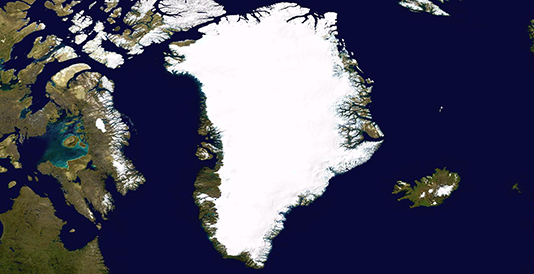 January 22, 2016 - Scientists from the University of South Florida, along with colleagues in Canada and the Netherlands, have determined that the influx of fresh water from the Greenland ice sheet is "freshening" the North Atlantic Ocean and could disrupt the Atlantic Meridional Overturning Circulation (AMOC), an important component of global ocean circulation that could have a global effect. Researchers say it could impact the future climate in places such as portions of Europe and North America.
January 22, 2016 - Scientists from the University of South Florida, along with colleagues in Canada and the Netherlands, have determined that the influx of fresh water from the Greenland ice sheet is "freshening" the North Atlantic Ocean and could disrupt the Atlantic Meridional Overturning Circulation (AMOC), an important component of global ocean circulation that could have a global effect. Researchers say it could impact the future climate in places such as portions of Europe and North America.Their study on the influence of freshwater influx on Labrador Sea convection and Atlantic circulation is published in a new issue of the journal Nature Communications.
"We derived a new estimate of recent freshwater flux from Greenland using updated GRACE satellite data," said USF professor Tim Dixon. "The data suggest that the influx of freshwater from Greenland is accelerating, and has changed the Labrador Sea in ways that could lead to a weakening of the AMOC."
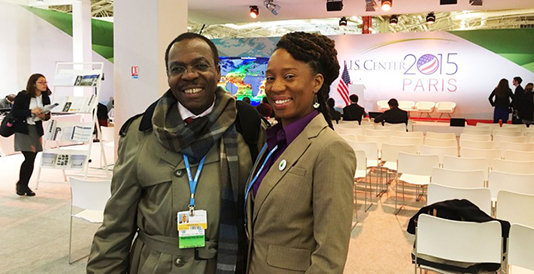 January 6, 2016 - Florida Agricultural and Mechanical University (FAMU) President Elmira Mangum, Ph.D., recently sent a letter to U.S. President Barack Obama pledging to solidify FAMU as a leading university in climate action. In her letter, Mangum applauded President Obama for the progress made to promote clean energy and climate action before the United Nations Climate Negotiations that took place in Paris in November. To ensure FAMU’s active participation in climate change discourse, FAMU Sustainability Institute (FAMU-SI) Faculty Director Odemari Mbuya travelled to Paris to attend the United Nations Framework Climate Change Convention Conference of the Parties 21st convening (COP21), where he gave a presentation.
January 6, 2016 - Florida Agricultural and Mechanical University (FAMU) President Elmira Mangum, Ph.D., recently sent a letter to U.S. President Barack Obama pledging to solidify FAMU as a leading university in climate action. In her letter, Mangum applauded President Obama for the progress made to promote clean energy and climate action before the United Nations Climate Negotiations that took place in Paris in November. To ensure FAMU’s active participation in climate change discourse, FAMU Sustainability Institute (FAMU-SI) Faculty Director Odemari Mbuya travelled to Paris to attend the United Nations Framework Climate Change Convention Conference of the Parties 21st convening (COP21), where he gave a presentation. As part of the Historically Black Colleges and Universities (HBCU) Climate Change Initiative, political science professor John Warford, Ph.D., accompanied FAMU environmental and political science students who traveled to Paris to participate in COP21. In addition to encouraging University participation in climate action on a global scale, Mangum is also dedicated to making all FAMU campuses more environmentally conscious. Her efforts include signing the American College and University Presidents’ Climate Commitment (ACUPCC) in January 2014; FAMU’s participation in the Better Buildings Challenge, committing to ensure all buildings on campus are 20 percent more energy efficient within 10 years; and the establishment of the FAMU Sustainability Institute (FAMU-SI), which is tasked with coordinating the implementation of broad social, environmental, and economic sustainability programs.
Mangum is among 600 college and university presidents and chancellors who have committed their institutions to take bold and catalytic climate actions. “Although we are optimistic that world leaders will reach an agreement to secure a transition to a low-carbon future, we recognize the urgent need to act now to avoid irreversible costs to our global community’s economic prosperity and public health,” Mangum said in the letter. As part of Mangum’s climate leadership commitment, she pledged that FAMU will develop a Climate Action Plan by May 2016, make carbon neutrality and climate resilience a part of the curriculum, expand research in climate science, and establish community partnerships to implement strategies for reducing carbon dependency on campus and in the surrounding community.
Source: FAMU News Release
Photo L-R: Odemari Mbuya, Ph.D. and Simone English, doctoral student
Source: FAMU News Release
Photo L-R: Odemari Mbuya, Ph.D. and Simone English, doctoral student
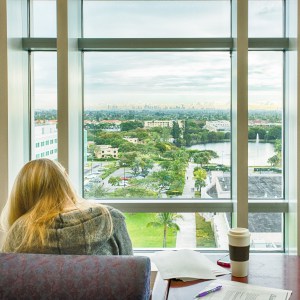 January 5, 2016 - No other place in the nation has higher risk to assets than Miami, Florida, and Florida Ranks very high among states that are least prepared for climate change impacts. The gravest climate change impact and threat to Miami is from sea level rise. Rising sea levels are creating challenges for both natural and human communities, and will impact the lowest elevation communities first. Understanding the causes, effects, and responses to sea level rise requires an interdisciplinary approach to short- and long-term strategies for mitigating the causes and effects of sea level rise. A holistic, system-oriented approach is posed that provides design and analysis toward decision-support for how we can adapt and even mitigate sea level rise now and into the future.
January 5, 2016 - No other place in the nation has higher risk to assets than Miami, Florida, and Florida Ranks very high among states that are least prepared for climate change impacts. The gravest climate change impact and threat to Miami is from sea level rise. Rising sea levels are creating challenges for both natural and human communities, and will impact the lowest elevation communities first. Understanding the causes, effects, and responses to sea level rise requires an interdisciplinary approach to short- and long-term strategies for mitigating the causes and effects of sea level rise. A holistic, system-oriented approach is posed that provides design and analysis toward decision-support for how we can adapt and even mitigate sea level rise now and into the future. The Sea Level Solutions Center is convening its inaugural Interdisciplinary Studio. This studio will provide the basis for an interdisciplinary framework for developing and conducting design and analyses for the natural-built environment under future sea level rise. Faculty from Colleges of Architecture and the Arts, Engineering and Computer Sciences, Arts and Sciences, Law, and Stempel College of Public Health and Social Work are among instructors who will provide lectures, training and analytical tools. The studio is scheduled to include a scoping charrette that engages stakeholders from the outset to guide the vision of the studio products. The course will culminate in delivery of several products that enable decision-support for an “optimized solution”, with information, data and analyses for each solution. Graduate students from any discipline are invited to register. Contact Dr. Tiffany Troxler (This email address is being protected from spambots. You need JavaScript enabled to view it.) with any questions about the course.
Source
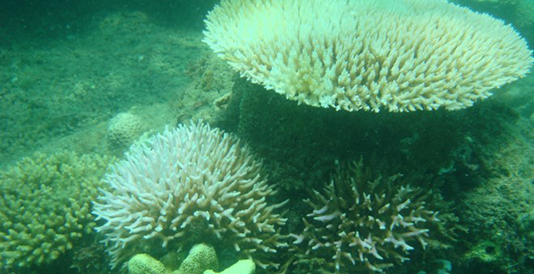 December 22, 2015 - New research from Florida Institute of Technology scientists Chris Cacciapaglia and Rob van Woesik shows that corals may survive better in warm oceans where the water is clouded by floating particles. Coral reefs, the most diverse marine ecosystems on the planet, are under increasing stress and are dying in many parts of the world as the oceans continue to warm. When high levels of sunlight combine with unnaturally warm temperatures, the corals don’t have much of a chance. Cacciapaglia and van Woesik’s study, appearing in the December issue of Global Change Biology, shows that moderate levels of turbidity – cloudy water – could lower stress by shading the corals from extremely high light.
December 22, 2015 - New research from Florida Institute of Technology scientists Chris Cacciapaglia and Rob van Woesik shows that corals may survive better in warm oceans where the water is clouded by floating particles. Coral reefs, the most diverse marine ecosystems on the planet, are under increasing stress and are dying in many parts of the world as the oceans continue to warm. When high levels of sunlight combine with unnaturally warm temperatures, the corals don’t have much of a chance. Cacciapaglia and van Woesik’s study, appearing in the December issue of Global Change Biology, shows that moderate levels of turbidity – cloudy water – could lower stress by shading the corals from extremely high light.FIT Press Release
Global Change Biology Journal Article
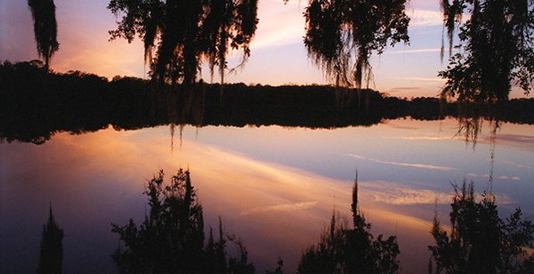 December 17, 2015 - Climate change is rapidly warming lakes around the world, threatening freshwater supplies and ecosystems, according to a new study spanning six continents. More than 60 scientists took part in the research, published in the journal Geophysical Research Letters and announced today at the fall meeting of the American Geophysical Union in San Francisco. The study authors include Karl Havens, director of the Florida Sea Grant program and a professor with the University of Florida Institute of Food and Agricultural Sciences. The study showed that lakes are warming an average of 0.6 degrees Fahrenheit each decade. That’s greater than the warming rate of either the oceans or the atmosphere, and it could have profound effects, scientists say.
December 17, 2015 - Climate change is rapidly warming lakes around the world, threatening freshwater supplies and ecosystems, according to a new study spanning six continents. More than 60 scientists took part in the research, published in the journal Geophysical Research Letters and announced today at the fall meeting of the American Geophysical Union in San Francisco. The study authors include Karl Havens, director of the Florida Sea Grant program and a professor with the University of Florida Institute of Food and Agricultural Sciences. The study showed that lakes are warming an average of 0.6 degrees Fahrenheit each decade. That’s greater than the warming rate of either the oceans or the atmosphere, and it could have profound effects, scientists say.UF Press Release
Geophysical Research Letters Journal Article
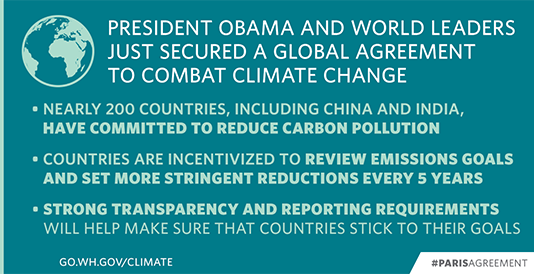 December 14, 2015 - More than 190 countries came together to #ActOnClimate by adopting the most ambitious climate change agreement in history! The Paris Agreement establishes a long term, durable global framework to reduce global greenhouse gas emissions. For the first time, all countries commit to putting forward successive and ambitious, nationally determined climate targets and reporting on their progress towards them using a rigorous, standardized process of review.
December 14, 2015 - More than 190 countries came together to #ActOnClimate by adopting the most ambitious climate change agreement in history! The Paris Agreement establishes a long term, durable global framework to reduce global greenhouse gas emissions. For the first time, all countries commit to putting forward successive and ambitious, nationally determined climate targets and reporting on their progress towards them using a rigorous, standardized process of review.Fact Sheet: U.S. Leadership and the Historic Paris Agreement to Combat Climate Change
Shareable GIF: https://pbs.twimg.com/tweet_video/CWDBdvQVEAAz9Bl.mp4
Video of the President’s Remarks: https://www.youtube.com/watch?v=zgj5MW3PsGM
Blog Posts from FIU: http://slsc.fiu.edu/category/news/cop21/
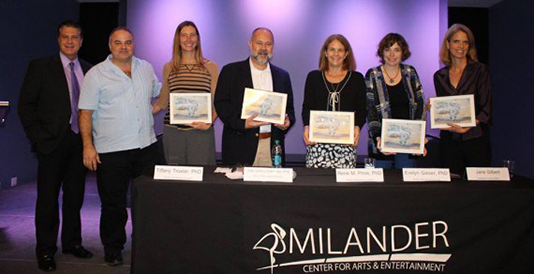 December 10, 2015 - With climate change conversations under way at the COP21 Paris Talks, the discussion on global climate change may seem distant to many communities – but not Hialeah. There, in the Milander Center for Arts and Entertainment, Xavier Cortada has brought the conversation home to South Florida with CLIMA, his solo art exhibit on climate change and sea-level rise. Cortada currently serves as artist-in-residence for FIU’s College of Arts & Sciences (CAS), School of Environment, Arts and Society (SEAS), and College of Architecture + The Arts (CARTA). Each day of the CLIMA exhibit included a special climate-inspired performance, display, or video by Cortada, as well as a panel discussion to cover topics related to the causes and/or effects of climate change and sea level rise. The panels were well-represented by FIU faculty, including Tiffany Troxler, Director of the FIU Sea Level Solutions Center (SLSC). The exhibit will continue to display a wide range of environmental art pieces until January 29, 2016.
December 10, 2015 - With climate change conversations under way at the COP21 Paris Talks, the discussion on global climate change may seem distant to many communities – but not Hialeah. There, in the Milander Center for Arts and Entertainment, Xavier Cortada has brought the conversation home to South Florida with CLIMA, his solo art exhibit on climate change and sea-level rise. Cortada currently serves as artist-in-residence for FIU’s College of Arts & Sciences (CAS), School of Environment, Arts and Society (SEAS), and College of Architecture + The Arts (CARTA). Each day of the CLIMA exhibit included a special climate-inspired performance, display, or video by Cortada, as well as a panel discussion to cover topics related to the causes and/or effects of climate change and sea level rise. The panels were well-represented by FIU faculty, including Tiffany Troxler, Director of the FIU Sea Level Solutions Center (SLSC). The exhibit will continue to display a wide range of environmental art pieces until January 29, 2016. FIU Alumni Association Article
Source: FIU News Release
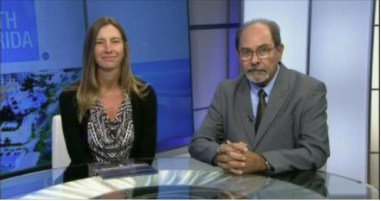 December 7, 2015 - CBS Miami’s Focus on South Florida segment recently featured FIU’s Tiffany Troxler, Director of the FIU Sea Level Solutions Center, and Henry Briceño, Associate Researcher at FIU’s Southeastern Environmental Research. The discussion occurred during the middle of the COP21 climate change talks in Paris, after President Obama recently cited Miami Beach as a specific example of why the US should commit to reducing greenhouse gas emissions. Drs. Troxler and Briceño each described what is currently being done to address the issues related to sea level rise in South Florida, and expressed their optimism going forward after the start of COP21. Watch the full video here >>
December 7, 2015 - CBS Miami’s Focus on South Florida segment recently featured FIU’s Tiffany Troxler, Director of the FIU Sea Level Solutions Center, and Henry Briceño, Associate Researcher at FIU’s Southeastern Environmental Research. The discussion occurred during the middle of the COP21 climate change talks in Paris, after President Obama recently cited Miami Beach as a specific example of why the US should commit to reducing greenhouse gas emissions. Drs. Troxler and Briceño each described what is currently being done to address the issues related to sea level rise in South Florida, and expressed their optimism going forward after the start of COP21. Watch the full video here >>
Source: FIU News Release
December 4, 2015 - On November 23, Florida state climatologist David Zierden was one of four scientists invited to a congressional briefing in Washington, DC where he provided background and explained the implications of the 2015-16 El Niño event. The four panelists discussed how El Niño forms, what impacts can be anticipated from the current event, as well as the opportunities and challenges in understanding, monitoring, and predicting the El Niño. Zierden stressed the importance of increasing the prediction accuracy for El Niño to better plan global and regional responses. In Florida, where the 1997-98 El Niño had severe impacts, water planners and farmers are preparing responses to expected impacts of this year's El Niño. The briefing highlighted the importance of continued investment in data assimilation, model improvement, and communication to stakeholders and decision makers to better predict and prepare for future El Niño events.
Consortium for Ocean Leadership News Release
Consortium for Ocean Leadership News Release
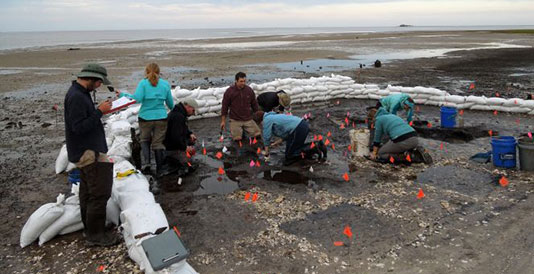 November 28, 2015 - A Tampa Bay Times article by Craig Pittman highlights research conducted by University of Florida archaeologist Ken Sassaman on how Florida's early inhabitants adapted to sea level changes:
November 28, 2015 - A Tampa Bay Times article by Craig Pittman highlights research conducted by University of Florida archaeologist Ken Sassaman on how Florida's early inhabitants adapted to sea level changes: "The 2012 emergency call sent archaeologists scrambling. Rising seas were washing away an ancient Indian burial ground near Cedar Key. They had to dig up the remaining graves and collect the bones before the whole thing disappeared into the Gulf of Mexico. But while digging, University of Florida archaeologist Ken Sassaman discovered something that surprised him. The burial ground of some 1,300 graves was actually a re-burial ground. The skeletons had been buried somewhere else, then moved to this spot. Florida's early inhabitants had done that, Sassaman said, because they were dealing with the same problem that's facing the low-lying Sunshine State now: waves that creep higher and higher, crumbling the coastline and forcing the inhabitants to make tough choices about the future. Their solution was to move everything important to them, including their ancestors, he explained."
Continue Reading Tampa Bay Times Article
Photo credit: Ken Sassaman
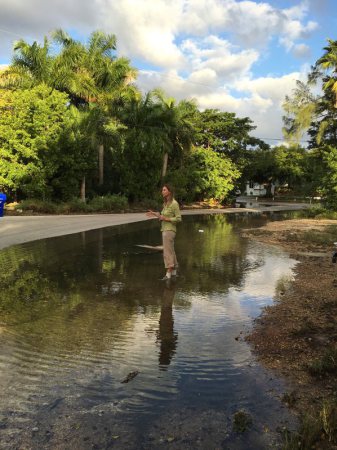 November 25, 2015 - On Tuesday, November 24, Tiffany Troxler, Director of FIU's Sea Level Solutions Center, gathered faculty and students at Little River Pocket Park in Miami, for a hands-on event during King Tide flooding. The event focused on a low-lying community where significant tidal flooding has been observed, but received little attention, in order to conduct a citizen science activity and emphasize that sea level rise is not just a Miami Beach issue. Faculty and students organized to take video and help attendees with data collection. Attendees also had the opportunity to view storm water pump activity and conduct water quality sampling.
November 25, 2015 - On Tuesday, November 24, Tiffany Troxler, Director of FIU's Sea Level Solutions Center, gathered faculty and students at Little River Pocket Park in Miami, for a hands-on event during King Tide flooding. The event focused on a low-lying community where significant tidal flooding has been observed, but received little attention, in order to conduct a citizen science activity and emphasize that sea level rise is not just a Miami Beach issue. Faculty and students organized to take video and help attendees with data collection. Attendees also had the opportunity to view storm water pump activity and conduct water quality sampling. The event comes less than a week before world leaders will convene in Paris for the 21st Conference of the Parties (COP21), to address climate change issues and formalize agreements to lower carbon emissions. Dr. Juliet Pinto, of FIU’s School of Journalism and Mass Communication, will attend the conference in Paris and stream daily updates.
Source: http://slsc.fiu.edu/citizens-engage-in-sea-level-solutions-with-eyes-on-the-rise/
Source: http://slsc.fiu.edu/citizens-engage-in-sea-level-solutions-with-eyes-on-the-rise/
November 25, 2015 - The following update was submitted by Jillian Drabik, an Ecosystem Science and Policy doctoral student at the University of Miami, on the status of a project on the South Florida Water, Sustainability and Climate Project funded by NSF and USDA and led by FIU:
Over the past twelve months we have made steady progress toward our project objectives. In addition to working toward individual and task group goals, we are also working within the context of the larger project goals. These goals are to develop: 1) a hydro-economic model for South Florida, 2) new information on the economic value of ecosystem services that can be used in modeling exercises, 3) management schemes to increase the resilience of the system to climate change and sea level rise, 4) our understanding of cognitive and perceptual biases in risk assessment and decision-making, and 5) adaptive management plans that optimize economic productivity, the value of ecosystem services, and which foster sustained public support in South Florida. Significant progress has been made on these objectives, including the release of the downscaled climate data for South Florida, further refinement of the penalty functions, and early discussion of selecting scenarios to examine with the hydro-economic model.
Over the next several months, the primary goal is to fully develop the different penalty functions and further engage with stakeholder groups for model input and feedback. Research in other areas including ecosystem service valuation, fisheries evaluation, and the decision and behavioral sciences continues to progress.
Over the past twelve months we have made steady progress toward our project objectives. In addition to working toward individual and task group goals, we are also working within the context of the larger project goals. These goals are to develop: 1) a hydro-economic model for South Florida, 2) new information on the economic value of ecosystem services that can be used in modeling exercises, 3) management schemes to increase the resilience of the system to climate change and sea level rise, 4) our understanding of cognitive and perceptual biases in risk assessment and decision-making, and 5) adaptive management plans that optimize economic productivity, the value of ecosystem services, and which foster sustained public support in South Florida. Significant progress has been made on these objectives, including the release of the downscaled climate data for South Florida, further refinement of the penalty functions, and early discussion of selecting scenarios to examine with the hydro-economic model.
Over the next several months, the primary goal is to fully develop the different penalty functions and further engage with stakeholder groups for model input and feedback. Research in other areas including ecosystem service valuation, fisheries evaluation, and the decision and behavioral sciences continues to progress.
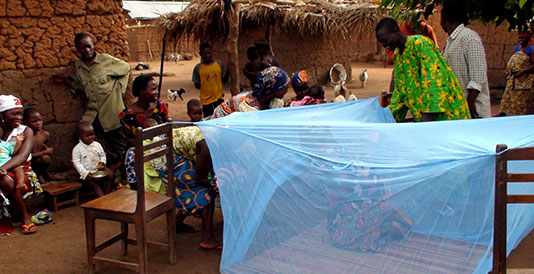 November 24, 2015 - A larger portion of Africa is currently at high risk for malaria transmission than previously predicted, according to a new University of Florida mapping study. Under future climate regimes, the area where the disease can be transmitted most easily will shrink, but the total transmission zone will expand and move into new territory, according to the study, which appears in the current issue of the journal Vector-Borne and Zoonotic Diseases. By 2080, the study shows, the year-round, highest-risk transmission zone will move from coastal West Africa, east to the Albertine Rift, between the Democratic Republic of Congo and Uganda. The area suitable for seasonal, lower-risk transmission will shift north into coastal sub-Saharan Africa. Most striking, some parts of Africa will become too hot for malaria. The overall expansion of malaria-vulnerable areas will challenge management of the deadly disease, said lead author Sadie Ryan, an assistant professor of geography at the University of Florida who also is affiliated with UF’s Emerging Pathogens Institute.
November 24, 2015 - A larger portion of Africa is currently at high risk for malaria transmission than previously predicted, according to a new University of Florida mapping study. Under future climate regimes, the area where the disease can be transmitted most easily will shrink, but the total transmission zone will expand and move into new territory, according to the study, which appears in the current issue of the journal Vector-Borne and Zoonotic Diseases. By 2080, the study shows, the year-round, highest-risk transmission zone will move from coastal West Africa, east to the Albertine Rift, between the Democratic Republic of Congo and Uganda. The area suitable for seasonal, lower-risk transmission will shift north into coastal sub-Saharan Africa. Most striking, some parts of Africa will become too hot for malaria. The overall expansion of malaria-vulnerable areas will challenge management of the deadly disease, said lead author Sadie Ryan, an assistant professor of geography at the University of Florida who also is affiliated with UF’s Emerging Pathogens Institute.UF News Release
Vector-Borne and Zoonotic Diseases Journal Article
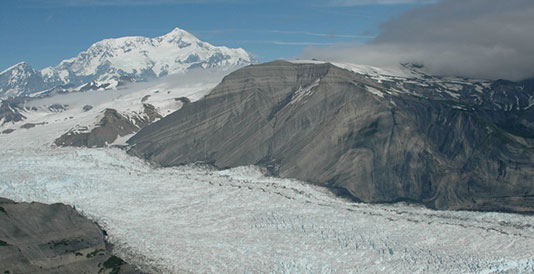 November 23, 2015 - Researchers for the first time have attempted to measure all the material leaving and entering a mountain range over more than a million years and discovered that erosion caused by glaciation during ice ages can, in the right circumstances, wear down mountains faster than plate tectonics can build them. The international study conducted by the Integrated Ocean Drilling Program and led by scientists from the University of Florida, The University of Texas at Austin and Oregon State University, adds insight into a longstanding debate about the balance of climate and tectonic forces that influence mountain building. It is published today in the Proceedings of the National Academy of Sciences. Researchers studied the St. Elias Mountains on the Alaskan coast and found that erosion accelerated sharply about 1 million years ago when global climate cooling triggered stronger and more persistent ice ages than times past.
November 23, 2015 - Researchers for the first time have attempted to measure all the material leaving and entering a mountain range over more than a million years and discovered that erosion caused by glaciation during ice ages can, in the right circumstances, wear down mountains faster than plate tectonics can build them. The international study conducted by the Integrated Ocean Drilling Program and led by scientists from the University of Florida, The University of Texas at Austin and Oregon State University, adds insight into a longstanding debate about the balance of climate and tectonic forces that influence mountain building. It is published today in the Proceedings of the National Academy of Sciences. Researchers studied the St. Elias Mountains on the Alaskan coast and found that erosion accelerated sharply about 1 million years ago when global climate cooling triggered stronger and more persistent ice ages than times past. "Humans often see mountain ranges as static, unyielding parts of the landscape,” said co-chief scientist John Jaeger, an associate professor of geology at the University of Florida. “But our work has shown that they are actively evolving along with, and responding to, Earth's climate, which just shows how truly dynamic and coupled this planet is."
UF News Release
PNAS Journal Article
Photo credit: Ken Ridgway, Purdue University
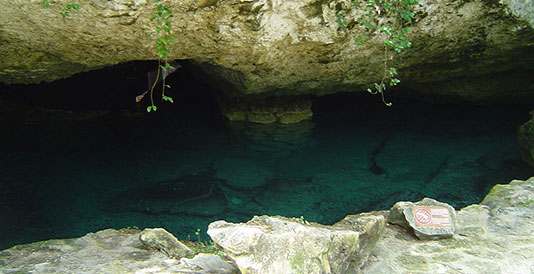 November 16, 2015 - Sea level research conducted by Andrea Dutton (UF Geology) is featured in a recent news article in the journal Science. Dr. Dutton's studies of fossil coral reefs exposed at an amusement park in Mexico suggest a rapid rise in sea level some 120,000 years ago, during a warm spell in Earth's history.
November 16, 2015 - Sea level research conducted by Andrea Dutton (UF Geology) is featured in a recent news article in the journal Science. Dr. Dutton's studies of fossil coral reefs exposed at an amusement park in Mexico suggest a rapid rise in sea level some 120,000 years ago, during a warm spell in Earth's history. Science Article
Photo Credit: Juan Carlos Garcia, CC
 November 19, 2015 - The FCI joined more than 200 university and college campuses, including FAMU and FIU, in signing the White Houses's American Campuses Act on Climate Pledge to demonstrating support for strong climate action by world leaders in Paris next month. The pledge reads:
November 19, 2015 - The FCI joined more than 200 university and college campuses, including FAMU and FIU, in signing the White Houses's American Campuses Act on Climate Pledge to demonstrating support for strong climate action by world leaders in Paris next month. The pledge reads: "As institutions of higher education, we applaud the progress already made to promote clean energy and climate action as we seek a comprehensive, ambitious agreement at the upcoming United Nations Climate Negotiations in Paris. We recognize the urgent need to act now to avoid irreversible costs to our global community’s economic prosperity and public health and are optimistic that world leaders will reach an agreement to secure a transition to a low carbon future. Today our school pledges to accelerate the transition to low-carbon energy while enhancing sustainable and resilient practices across our campus."
White House Fact Sheet

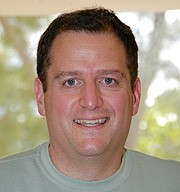 November 2, 2015 - Drs. O.S. Mbuya (Florida A&M University) and Ben Kirtman (University of Miami) will represent the Florida Climate Institute (FCI) at the United Nations Framework Convention on Climate Change (NFCCC), Conference of the Parties 21st (COP21) in Paris, France (http://www.cop21.gouv.fr/en/cop21-cmp11/what-cop21-cmp11) from November 30 through December 11, 2015. At the Conference, FCI will partner with India’s National Council for Climate, Sustainable Development and Public Leadership (NCCSD). The FCI representatives will showcase the scientific milestones achieved by the nine participating institutions on climate research and echo our commitment to address issues related to climate at national and global levels.
November 2, 2015 - Drs. O.S. Mbuya (Florida A&M University) and Ben Kirtman (University of Miami) will represent the Florida Climate Institute (FCI) at the United Nations Framework Convention on Climate Change (NFCCC), Conference of the Parties 21st (COP21) in Paris, France (http://www.cop21.gouv.fr/en/cop21-cmp11/what-cop21-cmp11) from November 30 through December 11, 2015. At the Conference, FCI will partner with India’s National Council for Climate, Sustainable Development and Public Leadership (NCCSD). The FCI representatives will showcase the scientific milestones achieved by the nine participating institutions on climate research and echo our commitment to address issues related to climate at national and global levels.












